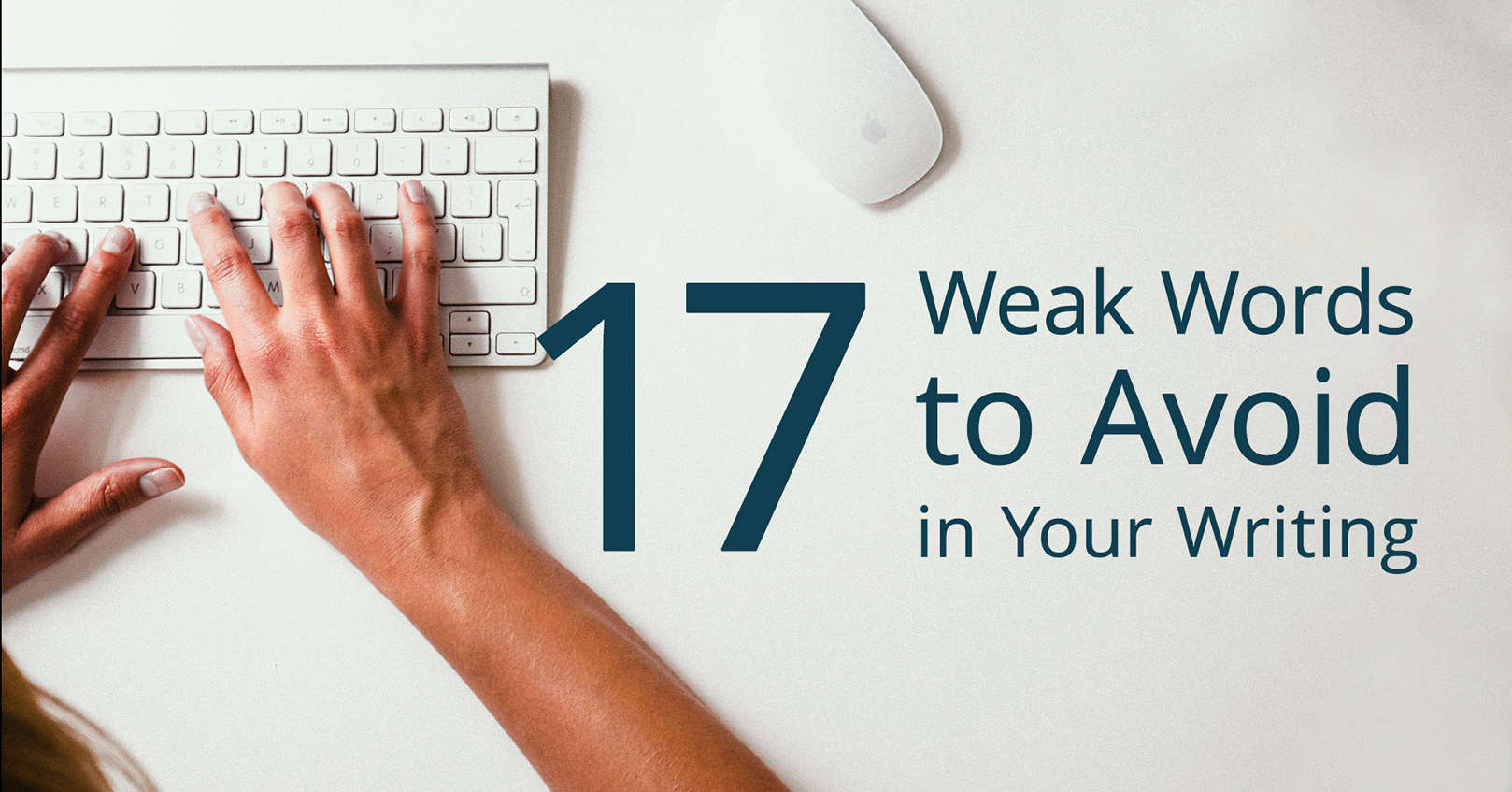
Want to make your writing a little stronger? Check out these 17 words to avoid!
Exact Words to Avoid
1. “really,” “very”
These words are usually unnecessary and can be cut out. If you need a stronger adjective, find one rather than adding “really” or “very” to it. (Exception: can be used sparingly in dialogue because it makes a character more realistic.)
2. “just”
“Just” is another word similar to “really” and, for the most part, should be deleted.
3. “that”
In general, beginning authors use too many of this word in their writing. Even old pros often search this word during the editing process to delete those that are unnecessary. Deleting extra words strengths your work.
4. “totally,” “completely,” “absolutely”
Like the previous words, these words don’t add to the sentence and can often be removed. Try using actions to show the feelings instead.
5. “thing,” “it”
“Thing” is vague and weak. Instead, replace “thing” with whatever you are talking about. Do the same with it. Unless you’ve already used the object you’re talking about in the sentence, don’t use the word “it.”
6. “there was”
Instead of starting of a sentence with the words “there was,” try rewording to put the action back in.
7. “as” used as a subordinate conjunction
“As” is confusing to the reader since it has two meanings: it can show that two things are happening at the same time, or it can show one thing is happening because of the other. Instead of using “as” for the second meaning, use the word “because” or “since” to make the meaning clear.
8. “down” or “up”
When used with a verb, these two words are usually unnecessary. For example, “He sat down on the dirty floor” should instead be “He sat on the dirty floor.”
9. “armed” in “armed gunman”
If the person is a gunman, then they are armed. Again, be careful to avoid redundant phrases.
10. “brief” in “brief moment”
All moments are brief; that’s why they’re moments.
11. “have got”
Avoid “got” where possible. Instead of saying “have got,” just use “have.” And actually, “got” isn’t a very useful word in any situation. Consider using the word sparingly. Instead of “She got to her feet,” you can say, “She leapt/jumped/climbed/hurried to her feet.” Anything to show better action.
12. “then” and “next”
When used to describe a sequence of events, these words are weak transitions. Sometimes you can remove the word without consequence; other times, you need to rewrite the sentence to show the sequence through action. For more examples, please see our post Make Your Book Stronger by Avoiding “Then.”
13. “literally”
Is it actually literal? Avoid this word unless using it in dialogue (and even then it can get old fast).
Types of Words to Avoid
14. be-verbs
Be-verbs (was, is, are, were, etc.) are weak and boring. Instead try to use action verbs. Especially avoid be-verbs paired with -ing verbs when they aren’t needed. For a simple example: “She was running through the forest when she tripped on a raised tree root” can be changed to “She ran through the forest and tripped on a raised tree root” or “Running through the forest, she tripped over a raise tree root and sprawled on the ground.” You get the idea!
Note, though, that sometimes a be-verb is what you need. We only advise that you avoid them when you can, without writing an awkward construction.
15. -ly adverbs
When you use -ly adverbs, you are telling instead of showing (which, in case you haven’t heard, is bad). Use -ly adverbs sparingly when writing fiction and instead, describe an action! We talk about this more in our post on dialogue tags (tip # 7).
16. “shrug,” “nod,” “reach,” “grin,” “sigh,” or any dialogue beats you overuse
We’re not telling you to not use these words. These words are examples of dialogue beats that often get overused, but each author has their own habits and their own words. Are your characters always shrugging, grinning, or sighing? Find out what words you overuse and try to edit some of them out—those listed here can get you started.
17. Nominalizations
A nominalization is when you take a verb or adjective and turn it into noun, making the sentence wordier and even pretentious. This includes words like accuracy, intention, disagreement, slowness, analysis, collection, and suggestion. When possible, turn that noun back into its original verb or adjective form (like accurate, intend, disagree, slow, analyze, collect, and suggest).
What words are on your “words to avoid” list? We’d love to hear in the comments below!












This article is a lifesaver! I only write for fun but since I like to post my little snippets and drafts, I want my small audience to stay engaged. I have this bookmarked and try to check every piece according to this guide, so it’s appreciated!
What about the word: “try”
We are trying to teach …..
Why not say “we teach….”
I definitely have a problem with sighing and nodding. My characters also seem to frown quite a lot!
One thing that you mention is ‘down’ etc. I find when reading, that many writers overuse prepositions, generally. So often they aren’t needed. I have a bit of a thing about them.
I’m reviewing a manuscript and hunting down the word “the.” I’m finding many places where it isn’t necessary. I haven’t seen any articles published on this, but have recently heard from other writers that they too are cutting back their use of “the.” Has anyone else out there heard talks or read blogs about this?
I’ve been removing “the” and sometimes I have to put them back to make the grammar checker happy. My least favorite is dueling grammar checkers with opposing suggestions. This seems to happen a lot with commas and “is this one word or two” (time line vs timeline, minigun vs mini-gun, etc.)
I’ve never heard of that.
“Said” is WAY too overused, and there are so many synonyms and more descriptive words rather than “said”.
I agree. It gets boring, yet we are constantly told ‘use said’ as it’s not noticed by readers.
Great article! I have a list of words I tend to overuse. I do a Find search through my manuscript to get rid of them.
Thanks for the article, it will help me greatly. I recognize several weaknesses in my writing from the words to “avoid”. My principals are the to be +ING and the word that, it is very difficult for me to change my sentences construction.
Having difficulty refraining from using the word ‘since.’ Since X happened, (then) Y occurred. Multi-syllabic synonyms don’t get the job done as well.
Hello, I’m looking for a “style” guide to tell me if a word is now considered or IS rude, offensive, pejorative, belittling of a person, and/or just plain ignorant.
In The Searcher, Tana French repeatedly has characters say things with a grin. It is driving me nuts.
These are dull and colorless compared to concrete nouns, powerful verbs, and vivid adjectives. Good writers try to avoid these empty, weak words and replace them with strong words.
Enjoyed. Thanks.